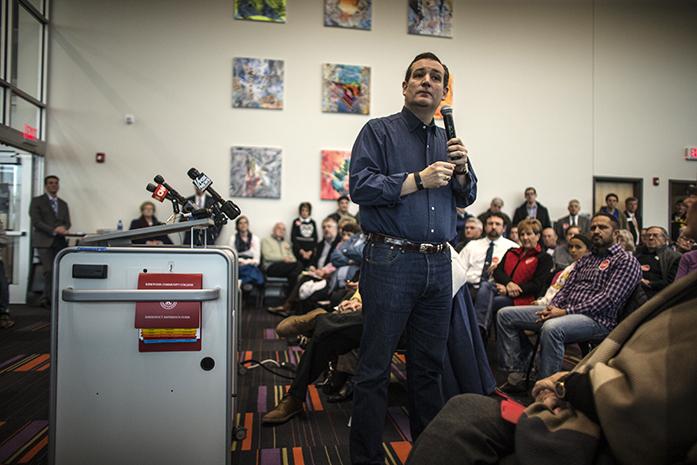After a weekend of Colorado delegates coalescing against GOP front-runner Donald Trump, Iowa political experts say it’s because Trump does not understand the rules and has pushed away support.
Texas Sen. Ted Cruz garnered support of 11 out of the 12 delegates allocated in Iowa congessional district conventions, with the 12h being undedicated.
Bill Keettel, the Johnson County GOP chairman, said the Cruz campaign had other advantages besides a superior understanding of the rules.
RELATED: Cruz moves on Iowa delegates
“All the other candidates have dropped out except for Kasich, Trump, and Cruz. The support of the others has coalesced behind Cruz,” said Keettel. “There’s a logical reason for this, and it’s that Trump has abused most of the others verbally and ticked off their supporters to the point that they will say, ‘Well, Cruz at least hasn’t abused us.’ ”
At the GOP congressional district conventions on April 9, Cruz supporters had a text-messaging system to ensure delegates elected were in favor of the Texas senator.
Iowa’s delegates are bound to caucus results, however. In the case of a second vote, the delegates become unbound.
Every state has different rules for delegates, said Steve Scheffler, an Iowa Republican national committee member. Cruz’s organization has studied the rules and developed a strategy for winning delegates in Iowa; Trump’s organization has not.
“It’s kind of a hodge-podge of different rules for different states,” said Scheffler. “It’s a very complex jigsaw puzzle. To the Cruz campaign’s credit, they studied the rules, and they knew how it worked, and that’s how it played out.”
Sen. Julian Garrett, R-Indianola, agreed with Scheffler’s assertion that Cruz’s campaign had a better understanding of the delegate process than did Trump’s.
“The Cruz supporters got their supporters to get themselves elected to go to their county conventions and the district conventions,” Garrett said. “The Trump organization did not do much to get their supporters to go to the county and district conventions.”
Though 12 delegates have been picked, Iowa still has 18 delegates to choose. Sen. Jason Schultz, R-Schleswig, said he expects Cruz to win those 18 delegates and also the majority of delegates nationwide.
“I expect Sen. Cruz to get the vast majority of delegates in Iowa and in other states as well,” Schultz said. “I don’t believe myself that the National Republican Convention will go past the second round. I think Cruz will become the nominee in the second round.”
Former Rep. Jim Leach, a UI visiting professor, said Cruz’s support can be attributed to his campaigning in Iowa.
“Donald Trump has been disadvantaged by not having a staff in place that understands the subtleties of the manner delegates come to be designated in the wake of the caucuses and primaries in a number of states, including Iowa,” Leach said. “Sen. Cruz’s organization, on the other hand, has aggressively used sophisticated process knowledge and its strongly committed supporter base to its advantage.”
In addition to not understanding how the delegate system worked, Keettel also said Trump’s status as a newcomer to the GOP party hurt him.
“In Iowa, there is a highly organized faction of the Republican Party that is led by longtime Republican activists and is heavily concentrated on Cruz,” he said. “I can tell you a dozen people in Johnson County who are very zealous for Cruz and are party activists. People who are zealous for Trump are, to a large extent, newcomers to party activism and will be around in the future but are getting their experience now. Whereas the people who are for Cruz are highly experienced and have been at this for years.”



